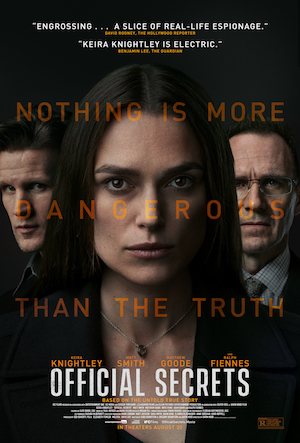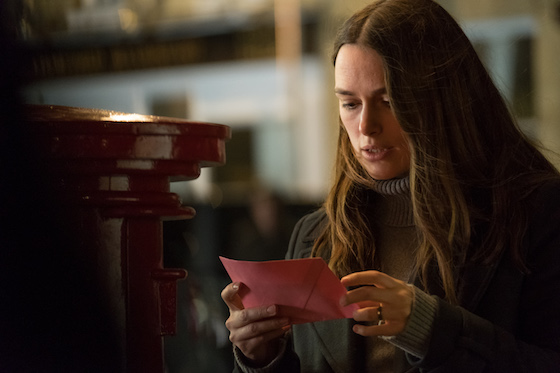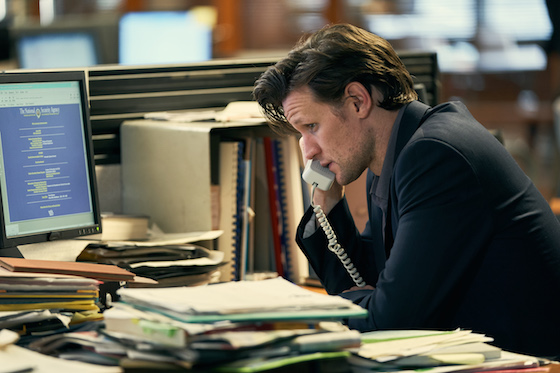

[Rating: Minor Rock Fist Up]
Moving away from bigger-budget razzle dazzle to more introspective fare, director Gavin Hood has course-corrected a bit too much, perhaps. The director of Hollywood watercooler pics like X-Men Origins: Wolverine, Ender’s Game, and Eye in the Sky, Hood has shifted gears somewhat with his newest picture, Official Secrets, a true story about a government whistleblower during the run-up to the 2003 Iraq War. It’s an interesting story staffed with top tier acting talent, yet a lack of narrative focus keeps it from ascending to heights it might have reached with just one main character instead of three.
Official Secrets opens at the dock of a London court, where Katharine Gun (Keira Knightley) stands before a judge to plead guilty or not guilty to a charge that basically amounts to treason. Before she can answer, the film flashes back to more than a year earlier, to early-2003, when Gun worked for Britain’s Government Communications Headquarters (GCH) analyzing audio intercepts. A low-level translator, Gun isn’t privy to anything earth-shattering intel-wise, but she does get CC’d on an official communication one day that gives her a moment of pause. The email is a request from America’s N.S.A., and asks for Britain’s help in bugging the offices of U.N. delegates who could potentially swing the vote in favor of war against Iraq.

Already skeptical of her country’s recent saber-rattling, the email is hard evidence that the governments of England and the U.S. are angling for a war by illegal means. Well aware of the binding confidentiality agreements that prohibit her from speaking out about the matter as a GCH employee, Gun decides to smuggle the email out in secret and pass it along to an anti-war friend with connections. One of these connections is a person who knows prominent journalist Martin Bright (Matt Smith), who works for The Observer and is eager for a chance to break what promises to be a major story.
It’s at this point that Official Secrets pivots to focus on Bright’s work at The Observer, and the internal struggle going on there about whether the paper will run with the N.S.A. leak at the risk of alienating their sources at 10 Downing Street. It’s an interesting bit of drama that pits Bright’s hawkish editor (Conleth Hill) against the publication’s war-suspicious reporter, Ed Vulliamy (Rhys Ifans), with Bright and Vulliamy ultimately winning out. Yet this isn’t the only pivot the film makes, shifting its focus yet again after Gun is revealed to be the source of the leak, which leads her to seek legal counsel from attorney Ben Emmerson (Ralph Fiennes). Emmerson sees Gun’s case as an opportunity to put Tony Blair’s government on trial by way of Gun’s prosecution, and it’s a decision that puts him at odds with both personal and professional allies.
If this all seems like a lot to juggle, it is, yet Hood (who also co-wrote the script) flashes some serious skill in keeping everything coherent and moving along at a brisk pace. The film is structured as an ensemble drama, giving near equal time to Bright, Gun, and Emmerson, which is both a blessing and a curse, here. All three narrative pieces complement each other well and round out the full picture of events in a tidy 110-minute runtime, yet the end result feels more like a well-researched docudrama than a film. The approach has a decided “just the facts, ma’am” feel to it that robs the characters of their agency at times, and compartmentalizes them into simple functions of the story. The audience isn’t given much to inform them of the reasons why Gun, Bright, or Emmerson do what they do, relying instead on a pious reading of the situation that robs it of nuance.

Had Official Secrets settled on just one of these three characters as the primary conduit through which this story is told, it might have allowed for a bit more depth to explore what the decision to leak, publish, or defend the email meant for them, personally or professionally (or both). There’s a subplot about Gun’s marriage to a resident alien whose immigration status is threatened by Gun’s actions, and it leads to one of the few really emotional scenes of the film, yet more of this is needed to push Official Secrets to a level that encourages the buy-in necessary to give it teeth.
And what kind of mark would these teeth leave? As it stands, Hood’s film is an engaging, well-acted, timely drama about the dangers of blind obedience to a state apparatus with far too few checks in place to keep it balanced. More than 15 years removed from the events portrayed and mired in a geopolitical hellscape whose daily revelations outstrip the controversy Gun uncovered, there needs to be more to this one. Whether it’s a humanizing of events by way of the characters, or a connection to the current Middle East crisis via a thru-line from 2003 to today, Official Secrets is missing something.
Still, it’s a damn fine film, and worth seeing if only to better understand the breadcrumb trail of deceit that led to a war whose consequences are still felt around the world today. Knightley, Smith, and Fiennes do superb work in the lead roles, and Hood proves that he doesn’t need a $100 million-dollar budget to make something interesting and relevant. And while the kernel of something greater does smack one in the face when watching Official Secrets, what remains is perfectly interesting, entertaining, and relevant.





Comments on this entry are closed.